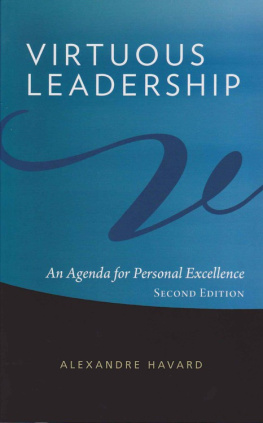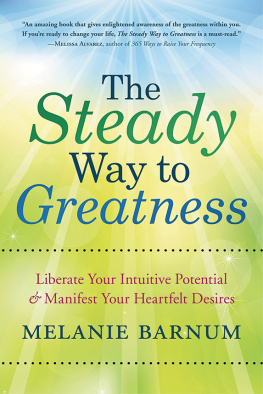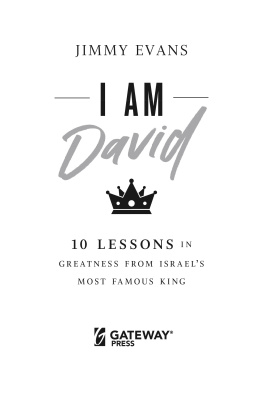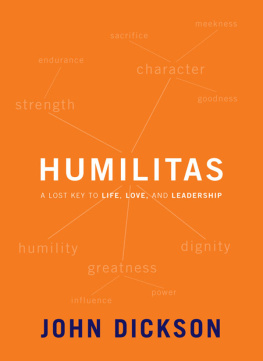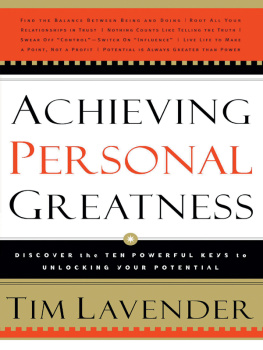


THE POWER of
MAGNANIMITY
Alexandre Havard

Copyright 2014 by Alexandre Havard
The total or partial reproduction of this book is not permitted, nor its informatic treatment, or the transmission of any form or by any means, either electronic, mechanic, photocopy, or other methods without the prior written permission of the owners of the copyright.
Scripture texts from the New and Old Testaments are taken from The Holy Bible Revised Standard Catholic Edition 1965 and 1966 by the Division of Christian Education of the National Council of the Churches of Christ in the United States. All rights reserved. All copyrighted material is used by permission of the copyright owner. No part of it may be reproduced without permission in writing from the copyright owner.
copyright 2014 by Scepter Publishers, Inc.
P.O. Box 1391
New Rochelle, NY 10801
www.scepterpublishers.org
All rights reserved.
Translation from the French by Anthony T. Salvia
Text and cover design by Rose Design
Printed in the United States of America
ISBN: 978-159417-217-5
ABOUT THE AUTHOR
Alexandre Havard is the author of the Virtuous Leadership system and the founder of the Havard Virtuous Leadership Institute (www.hvli.org). Born in Paris, he is a barrister by profession, having graduated from the Ren Descartes University, one of Frances leading law schools, and practiced law in several European countries. He is now living and working in Moscow, where he offers seminars in Virtuous Leadership to senior business executives and university students. In the United States Alexandre Havard presented at the U.S. Army War College, the Harvard Business School and the Corporation Service Company (CSC). His book Virtuous Leadership (New York, Scepter Publishers, 2007) has been translated into fifteen languages.
In this depraved centurywhen European society is overcome with laziness, existential ennui and disbelief, when everywhere a bizarre mixture of hatred of life and fear of death reigns, when the best people sit idle, justifying their laziness and debauchery by their lack of clear life objectivesinspired souls are as necessary as the sun. These personalities are living evidence that in society there are still people of a higher order, people of heroic deeds, faith, and clearly defined objectives.
Anton Pavlovich Chekhov
CONTENTS
In 1983, I took a break from my law studies in Paris to spend an unforgettable month with my Georgian great aunt, Elena, and her son Thamaz. They lived in Tbilisi, capital of the Soviet Republic of Georgia.
By the time I returned in 1990, the Soviet Union was on the verge of collapse and Aunt Elena had passed away. I was distressed to find that Thamaz had not yet fully recovered from his loss. He loved his mother more than anyone else. He had never left her side since the traumatic day in 1938 when his father was arrested and shot by the Communist secret police. He was then ten years old.
One evening, we drove to the cemetery to pay our respects to Aunt Elena. Thamaz was at the wheel of his Soviet-made Zhiguli. The closer we came to the cemetery, the more emotional Thamaz became. It had been raining. The road was bad. It was a slick, narrow mountain road, and it was nighttime. Suddenly, Thamaz turned towards me: Are you afraid? Ashamed to say otherwise, I replied, No! To my shock, he stepped on the accelerator.
I hardly had time to invoke my guardian angel when the car went sailing out over a precipice and down into the abyss, only to land some seconds later in the heart of the mountain cemetery. Its windshield shattered to bits, the Zhiguli wound up suspended between two headstones. We had to exercise extreme caution in exiting the vehicle so as not to disturb the delicate balance. Several meters further on: a seemingly bottomless ravine.
We extricated ourselves gingerly and went down the mountain on foot and in silence without encountering a single vehicle. Thamaz finally said: Too bad we ruined some headstones that didnt belong to us.
An hour later, we managed to flag down a car and hitched a ride back to Tbilisi. It was two oclock in the morning.
For several days thereafter, I reflected on our misadventure. Although it ended badly, it could have been much worse. I was disappointed in Thamaz, but said nothing. Eventually, I understood that this sixty-year-old man had lost a long time agoprobably at the age of ten when his father was arrested by the Soviet KGBnot just a sense of orientation in life, but also a sense of life as such.
Often I think of Thamaz and of the millions of people wounded in one way or another by the ideological projects of the twentieth century. I think of the emptiness, the devastation it produced in hearts, and of current global policy, which, by focusing exclusively on economics, only aggravates these wounds.
I also think of all those who, unlike Thamaz, have known the warmth of hearth and home, because they had a father and a mother who loved them and educated them in truth, freedom, and virtueand yet who, despite all of these advantages, for one reason or another, have not grasped the amplitude of their responsibilities before God and man, turn their backs on their vocation, or do not seek to discover and fulfill their mission in life.
It is to those men and women, whether young or not so young, that I dedicate this work.

In Virtuous Leadership: An Agenda for Personal Excellence, published in 2007 in the United States, I set forth my vision of leadership. This vision can be summarized in the following points:
. Authentic leadership must be based on an authentic anthropology, one that includes aretology, the science of virtues. Virtue is a habit of the mind, the will and the heart, which allows us to achieve personal excellence and effectiveness. Leadership is intrinsically linked to virtue. First, because virtue creates trustthe sine qua non of leadership. Second, because virtue, which comes from the Latin virtus, meaning strength or power, is a dynamic force that enhances the leaders capacity to act. Virtue allows the leader to do what people expect of him.
. Magnanimity and humility, which are principally virtues of the heart, constitute the essence of leadership. Magnanimity is the habit of striving for great things. Leaders are magnanimous in their dreams, their visions, and their sense of mission; also in their capacity to challenge themselves and those around them. Humility is the habit of serving others. Humility means pulling rather than pushing, teaching rather than ordering about, inspiring rather than berating. Thus, leadership is less about displays of power than the empowerment of others. To practice humility is to bring out the greatness in others, to give them the capacity to realize their human potential. In this sense leaders are always teachers and fathers/mothers. Their followers are the ones they serve. Magnanimity and humility are virtues specific to leaders; together they constitute the essence of leadership.
. The virtues of prudence (practical wisdom), courage, self-control and justice, which are mainly virtues of the mind and the will, constitute the foundations of leadership. Prudence
Next page

